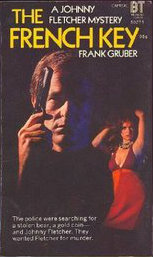The French Key by Frank Gruber
Review by Matt B. (BuffaloSavage)
Frank Gruber was a professional writer that wrote for the pulps, radio, and movies. In two novels of his I’ve read, the mood is noir without violence, starring believable characters, and having an air of verisimilitude that will please those of us into 1930s and 1940s Americana.
In The French Key (1939), Johnny Fletcher and Sam Cragg’s ostensible job is selling a book on physical fitness. Johnny, the brains of the outfit, acts as the spieler and Sam, the brawn, exemplifies the benefits of fitness by breaking a chain wrapped around his chest. They experience financial ups and downs so they are not as scrupulous as they should be about saving and making money. Having decided to stiff the hotel for the tariff, they must get their luggage out of their room.
However, they discover the body of a man on the bed, clutching a gold coin in his cold hand. Fletcher, seizing the opportunity, grabs the coin and later is informed by a coin dealer that it is the most valuable US coin ever minted. Johnny, over Sam’s protests, decides to play private detective in order to clear them of suspicion of murder. Doing so, they are caught up in a gold hoarding scheme.
Like many pulp writers, Gruber held many jobs before he turned to writing: farm boy, soldier, bell-hop, ticket-taker at a theater, and writing hack. His descriptions of fifth-rate hotel rooms and sleazy rooming houses are totally convincing. The background touches give us a confident feeling that the author is writing about people, places, and things that he knows all too well. The antique slang and turns of phrase (“When are we going to put on the nose bag?” grouses a hungry Sam), the hustler’s grave chivalry toward the ladies, and careful naming of streets in New York City feel authentic. The characters are very old-school American – plain, warm, outgoing, confident, resourceful — to me.
Two anachronisms startled me. One character had a “Beatle haircut” – in February of 1964, TIME magazine referred to the hair of the Fab Four as “mushroom haircuts.” Two characters fought it out like “Sonny Liston and Cassius Clay” – February, 1964. Coincidence? I think not. But I have no explanation since the Capital pocket PB edition I read is from October, 1972 – the cover picture indeed looks very Seventies. Maybe Gruber himself updated it – he passed away in 1969, acknowledged as one of the “Kings of Pulp Fiction.”


